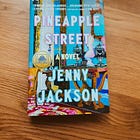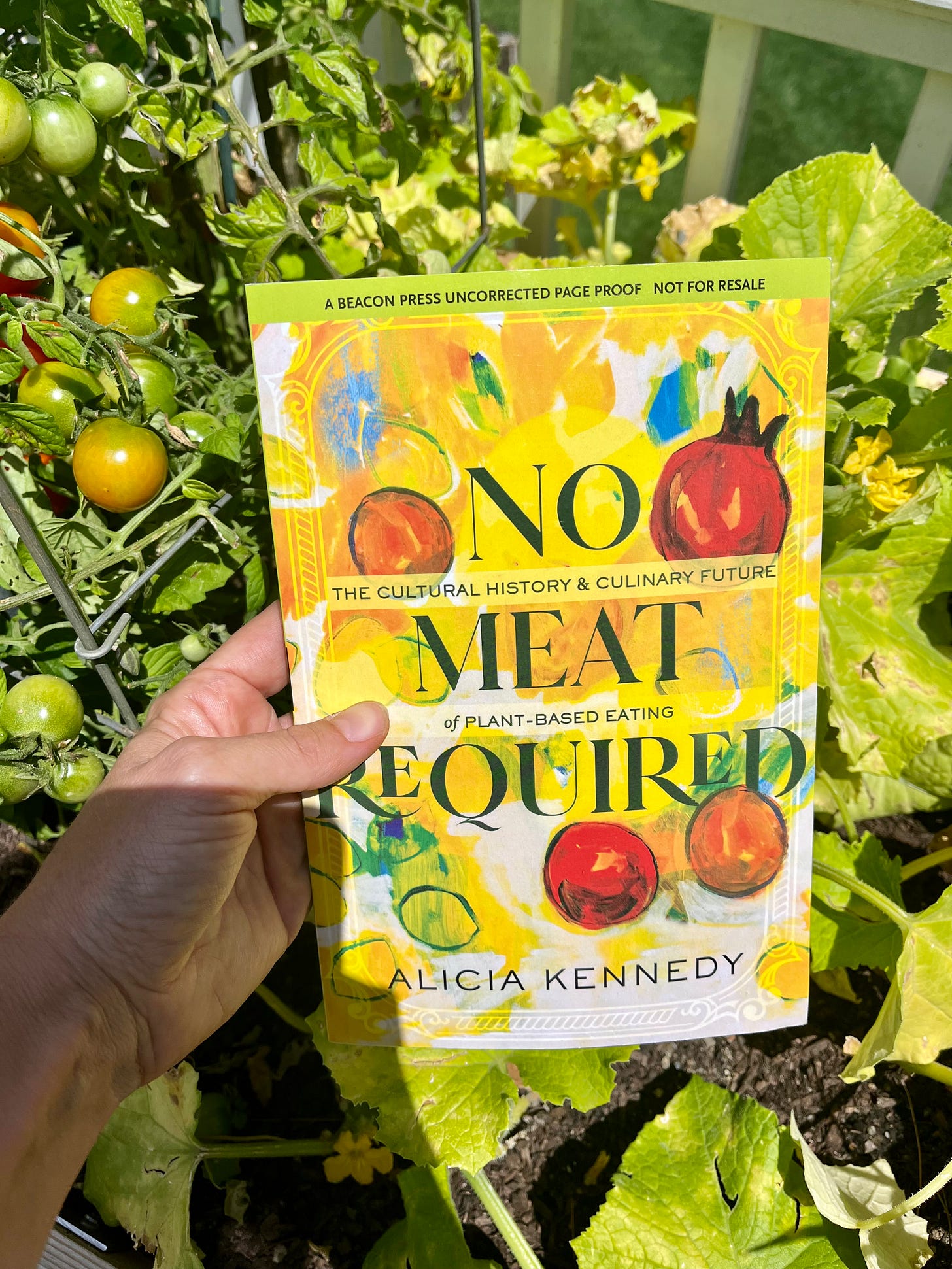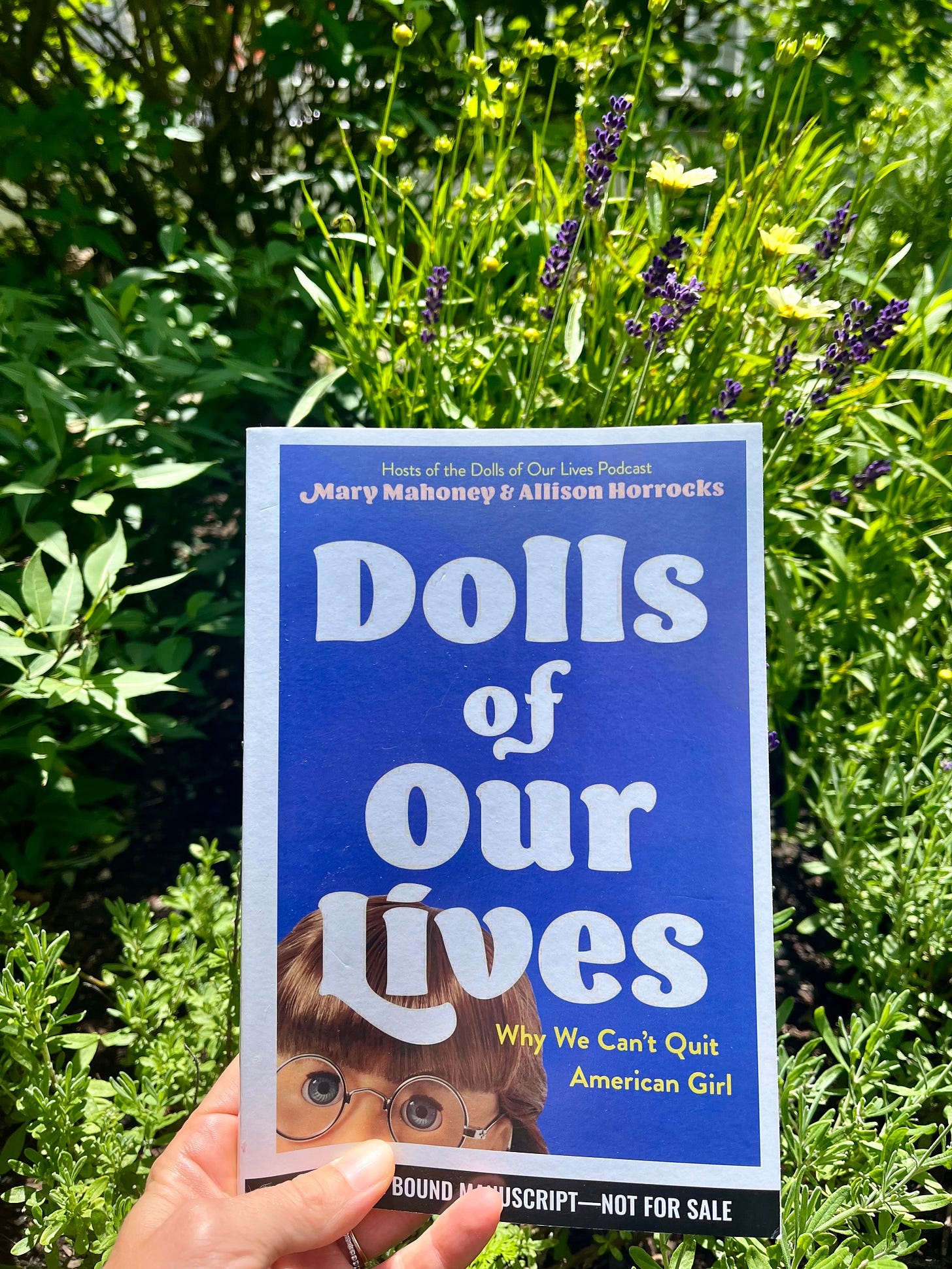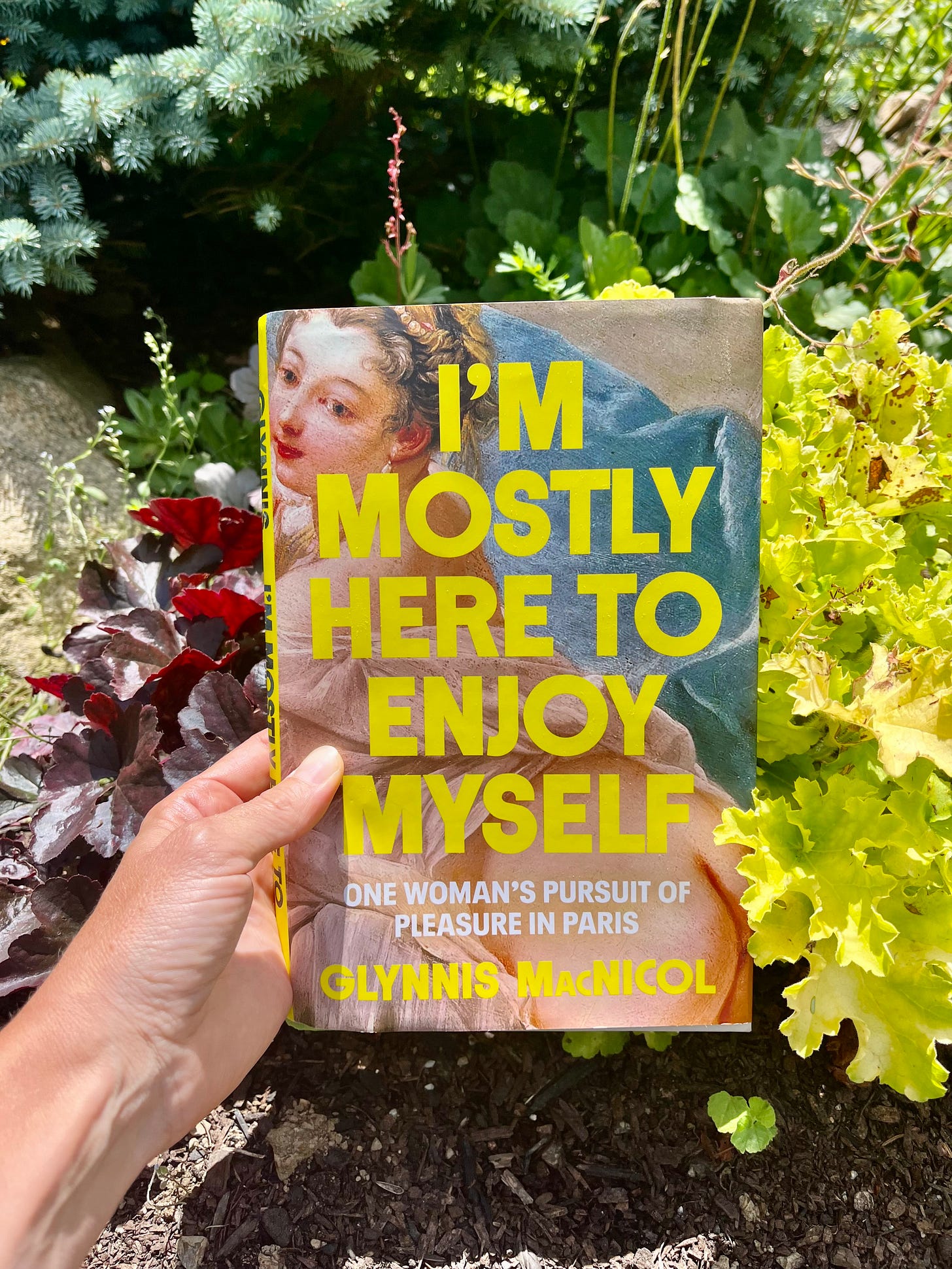I love a good beach read. They’re transportive, fun, and infinitely pleasurable. And, thanks to Wednesday’s thread (just picked up BAD SUMMER PEOPLE from the library and I’m really psyched to dig in), I have a huge TBR list to look forward to. Bring on the ocean breezes and torrid affairs. Bring on the rich people behaving badly!
But I also love reading a book that isn’t a beach read - on the beach.
Last year, I spent some of my most fully immersed reading moments on Cape Cod Bay deeply invested in Rebecca Makkai’s I Have Some Questions For You, which is a darkly atmospheric #metoo whodunnit set in the woods of a New Hampshire boarding school. Less rosé all day vibes and more true crime and interrogations of goodness vibes. Turns out, warm sand and waves are just as conducive to murder as they are to wedding hijinks!
I Have Some Questions For You is a novel, but today, I want to really stretch the limits of our definition of beach reads and devote all my beach reading enthusiasm to nonfiction. I write nonfiction. I LOVE nonfiction. And it strikes me as patently unfair that fiction gets all the summer lovin’ when it comes to page-turning bliss. So join me in celebrating these five nonfiction delights - I loved them and hope you will too!
As a nod to summer, I paired each of these beauties with an appropriately seasonal backdrop. Please enjoy and applaud my amateur bookstagram efforts 💃
writes one of my longtime fave Substacks, , in which she shares essays about travel writing, food photography, regional cooking, recipe inspo, domesticity, labor rights, and the effects of colonialism on our understanding of food. In No Meat Required, which just came out in paperback (hooray!) she does all that and more, and the result is a delicious (pun absolutely intended) and eye-opening read. Regardless of whether or not you’re curious about a plant based diet, you will find so many of your assumptions about food and culture challenged in these fascinating, colorful, rigorously researched pages. Here’s an excerpt!Making sure meat feels as essential as air is part of the American project, beacuse meat means everything in the United States. Masculine virility, affluence, and white cowboys overtaking the plains have long been key elements of the American imaginary, and they are what meat—specifically beef—represents culturally and politically. It’s that connection to American identity that leads people to shout and shut their ears when any of the horrors of meat production are noted, much like the killing of Indigenous peoples has been made invisible in the national narrative. IT’s that connection that saw President Donald Trump declaring meat processing “critical infrastructure” at the start of the coronavirus pandemic, without ensuring workers would be safe or even compensated for working at such incredible risk to their health. Between April 2020 and April 2021, nearly sixty thousand meatpacking workers became infected with the virus. We will stop at nothing to keep meat plentiful, even going so far as to create fake burgers that bleed.
Alicia’s argument in favor of No Meat Required for your Beach Read consideration:
No Meat Required is great inspiration for packing a hippie sandwich of sprouts, marinated tofu, and heirloom farmers' market tomato on nice sourdough to enjoy with saltwater in view.
In her memoir, The Year of the Horses, Courtney asks questions about modes of healing, personal growth, and reinvention as she turns to her old and largely abandoned love of horses to dig herself out of depression. Interweaving historical analysis and little gems of other horse women’s stories throughout her own, this book is a multifaceted gift. Here’s an excerpt!
Though I felt like I was a disaster in the arena, I was nevertheless there, present and alive. I felt solid and visible, suddenly aware that even my ineptitude, I was needed by my teammates.
“I don’t know what I’m doing,” I admitted to my new friend as we strode side by side on our first walk break. Lizzie’s face reddened, but she managed a tight smile: apparently she was less loquacious at a walk than at the gallop.
“You just need to play,” Lizzie insisted, as Alison blew the whistle to signal that the game was starting up again.
Courtney’s argument in favor of The Year of the Horses for your Beach Read consideration:
The Year of the Horses encourages—neigh—celebrates the return of amateur hour where we fight the pressure to excel and ‘kill’ at everything and instead partake in activities that we do just for the joy and fun of it. This book is a call to arms to don a tutu, set up a painting easel, get back to improv and a capella and whatever makes your heart sing and spit in the face of the blue check verified culture where you need to be a ‘boss’ at everything you undertake.
My favorite Christmas morning to THIS DAY was the one when I received Kirsten. Like so many girls who grew up in the 80s and early 90s, I had dog-eared and underlined pages upon pages of the American Girl catalogue, but it wasn’t until the age of nine that I had the thrill of seeing that long maroon cardboard box with my own eyes. I played with Kirsten (and later Felicity) alongside my sister, who played with Samantha (and later Molly - an EMBARRASSMENT of riches to be sure) for years, hauling the dolls with us into the woods to play Pioneer Girl and playing school and going on vacation and and and. I pored over the books. I learned about history. About myself. I was (and still am) A STAN.
And so are the authors of Dolls Of Our Lives, as they take us through the history of American Girl, its cultural legacy, and the girlhood stories it embraced (as well as those that it failed to embrace). Here’s an excerpt!
(who also writes a very delectable pop culture newsletter, ) makes her argument in favor of Dolls of Our Lives for your Beach Read Consideration:American Girl builds on a trope we’ve talked about on our show of the expectation that it’s women’s jobs to make everything okay for everyone in their world, putting their own needs last. The girls are not the most selfless people in the worlds (cough, Molly), but they are presented in family units where their mother is often very self-sacrificing (if she’s alive, RIP Samantha’s and Josefina’s moms). The suggestion in asking them to save the day as girls is that it’s in some ways preparing them to not only be brave, but also be the hero, or savior, of their families as adult wives and mothers.
This history | travelogue | memoir is for anyone who identifies as a Molly (a patriotic overachiever with a flair for drama), Felicity (the original horse girl), Kirsten (a cottage core fan who seems immune to cholera), Samantha (a savior complex in a savior suit), or any of the other American Girls whose dolls and stories shaped millennial childhoods and beyond. Revisit the brand (and girls) you grew up with, and time travel from the 1880s to the 1980s (and beyond!) all without leaving your beach chair.
There’s no one like Glynnis MacNicol when it comes to writing about pleasure and reimagining the limits and wide open expanses of a woman’s life. I loved her first book, No One Tells You This, about Glynnis’s journey to forge her own narrative as a single, child-free woman, and holy shit I SALIVATED over I’m Mostly Here To Enjoy Myself, which tracks Glynnis enjoying the hell out of summer in Paris. There is unabashed desire for human touch, there is PARIS, there are bikes, there is (obviously) gooey cheese. And there is Glynnis’s beautiful insights self-knowledge, community, and, of course, joy. Here’s an excerpt!
So far, aging often feels like an exercise in gaslighting. You might feel great. You might look great. And yet everyone and everything is telling it’s terrible. It’s all terrible. Eventually every day becomes an endless decision to choose reality over consensus. I am feeling this, so it must be true versus everyone says this is true, so I will feel it too. The disconnect is so extreme at times, I find the result is I’ve come to distrust literally every story we’ve ever been told to expect as women, even when some of them have turned out to be true. To choose to enjoy things, simply because they are enjoyable, even if no one quite believes you. To understand things are hard, even when you are constantly being told they are not as hard. This is true loneliness, I sometimes want to say. Because so much of enjoyment, and so much of bearing the hardest things, relies on the ability to do so with others. Misery loves company, but so does joy. And not the company of one other person. So many women in my life are told daily by their partner that they are beautiful, and yet move through the world feeling ugly. We need the company of a narrative.
Glynnis’s argument in favor of I’m Mostly Here To Enjoy Myself for your Beach Read consideration:
This book contains multitudes of pleasures: food, friendship, Paris, history, adventure, the ocean, nudity, sex. But recently a reader told me the thing she found most erotic about it are the descriptions of rest. I hope what readers find here as they are resting is the ability to do so without second guessing whether they deserve it.
Before writing Momfluenced, I toyed with writing a memoir about my maternal story as held up against my mother’s. So much of my own experience of life and motherhood and the effort of being in the world has been transmuted through my mother’s voice, and the theme of the mother-daughter bond is one I’ll never tire of exploring. Which is why, in a book largely about influencer culture, I ended up devoting an entire chapter to my own mother/daughter lore in Momfluenced. Because to write about our mothers is to write about everything.
In Love Is A Burning Thing, Nina St. Pierre writes about generational trauma, about mental illness, and the constant push and pull of giving and receiving and wanting so many of us experience in relation to our mothers. And to ourselves. As author Zaina Arafat writes, “Love Is A Burning Thing will sear your heart in two and leave you smoldering.” Here’s an excerpt!
I imagine [my mother] at twenty, in a body she no longer recognized, learning to fight for a life she’d been willing to end. I’m thinking now about how she was ready to sacrifices not just her life, but her body; about yīshēn, the Chinese Buddhist concept of flesh as a portal. I’m thinking of the difference between yīshēn, “abandoning the body, or shěshēn, “giving it up.”
So many layers of soot and history, all the stories we don’t even know about came before. A matryoshka doll of stories we cannot understand with our minds but that live through us compulsively. Maybe that’s what past lives are. Not individual reincarnation but the endless march of the family line. Restarted, resuscitated, again, and again.
Nina’s argument in favor of Love is a Burning Thing for your Beach Read consideration:
Love is a Burning Thing is an ideal beach read because it captures all the adventure and freedom synonymous with summer, while steering away from the sticky-sweet literary popsicles often found on summer reading lists. No shade. We love those, too. But who says beach reads have to be buoyant? Some of us like to sink to the floor of the existential sea no matter how blaring the sun!
If you’d like a chance to win a copy of one of these beautiful books, just comment the title below!
Book giveaways are only open to paid subscribers, so if you’d like to upgrade, here’s that purple button 💫💫💫 Paid subscriptions make this newsletter possible - thank you so much for your support!










No Meat Required😍
I want to read IM MOSTLY HERE TO ENJOY MYSELF because I loved the Wilder podcast. And DOLLS OF OUR LIVES (I was a Molly-and-Samantha girl too)
WHY FISH DONT EXIST and THE ART THIEF are also on my non-fiction list for this summer.